 This psychological ghost story by Ellen Glasgow combines themes of the supernatural, crime (murder) and justice (revenge). A young nurse besotted by a popular doctor is assigned as night-nurse to his ailing wife. The woman, who is recovering from the death of her young daughter from a previous marriage, is suffering “hallucinations” that the girl is still alive. When the nurse claims that she, too, can see the spectral child, the mother confides that her husband killed her. The woman dies soon afterwards and, when the doctor claims her multi-million dollar estate, justice is served in an unexpected manner. More…
This psychological ghost story by Ellen Glasgow combines themes of the supernatural, crime (murder) and justice (revenge). A young nurse besotted by a popular doctor is assigned as night-nurse to his ailing wife. The woman, who is recovering from the death of her young daughter from a previous marriage, is suffering “hallucinations” that the girl is still alive. When the nurse claims that she, too, can see the spectral child, the mother confides that her husband killed her. The woman dies soon afterwards and, when the doctor claims her multi-million dollar estate, justice is served in an unexpected manner. More…
Archives
The Final Problem / Empty House
 Today we have two stories by Arthur Conan Doyle dealing with the “death” and “rebirth” of Sherlock Holmes. In The Final Problem, Holmes has his first and last encounter with master criminal and his intellectual equal, Professor James Moriarty. After a pursuit across Europe, the pair are believed to have perished when they tumbled off the Reichenbach Falls during a struggle. In the Adventure of the Empty House, Holmes miraculously returns to bring three remaining members of Moriarty’s criminal network to justice. In capturing the first, he solves an important murder investigation. Themes include justice, pursuit, deception, courage, sacrifice, death. More…
Today we have two stories by Arthur Conan Doyle dealing with the “death” and “rebirth” of Sherlock Holmes. In The Final Problem, Holmes has his first and last encounter with master criminal and his intellectual equal, Professor James Moriarty. After a pursuit across Europe, the pair are believed to have perished when they tumbled off the Reichenbach Falls during a struggle. In the Adventure of the Empty House, Holmes miraculously returns to bring three remaining members of Moriarty’s criminal network to justice. In capturing the first, he solves an important murder investigation. Themes include justice, pursuit, deception, courage, sacrifice, death. More…
Philomel Cottage
 This romantic story with a deadly twist is one of Agatha Christie’s lesser-known tales. Shortly after newly-weds Alix and Gerald move into secluded Philomel Cottage, Alix hears some disturbing news from the gardener. Gerald’s angry reaction when she asks him about it makes her realize how little she really knows about him. She sets out to fill in the gaps and discovers a trail of bigamy, swindling, murder, and escape form prison. Sensing danger, some quick thinking and a terrible-tasting new brand of coffee save her life. Themes include love and romance, manipulation, isolation, innocence, curiosity, fear, and the supernatural. More…
This romantic story with a deadly twist is one of Agatha Christie’s lesser-known tales. Shortly after newly-weds Alix and Gerald move into secluded Philomel Cottage, Alix hears some disturbing news from the gardener. Gerald’s angry reaction when she asks him about it makes her realize how little she really knows about him. She sets out to fill in the gaps and discovers a trail of bigamy, swindling, murder, and escape form prison. Sensing danger, some quick thinking and a terrible-tasting new brand of coffee save her life. Themes include love and romance, manipulation, isolation, innocence, curiosity, fear, and the supernatural. More…
A Retrieved Reformation
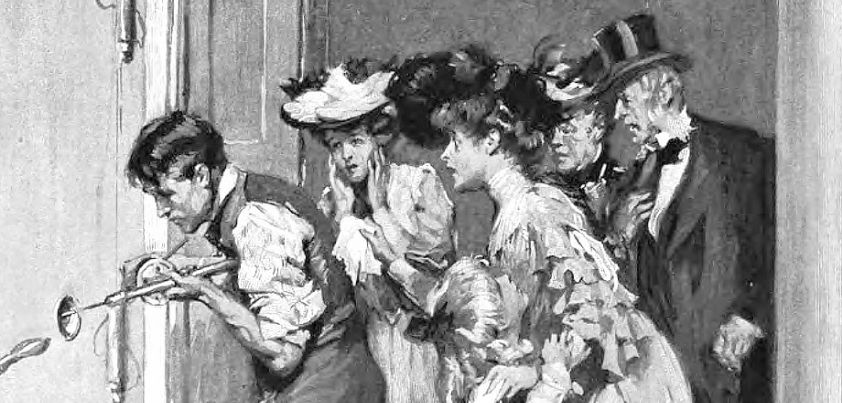 In this story from William porter (aka O. Henry), safe-cracker Jimmy Valentine gives up his life of crime for love. He changes his identity, builds a successful business, and becomes a model citizen. Unfortunately, police detective Ben Price is hot on Jimmy’s trail. The title reflects Price’s decision to let Jimmy “retrieve” his “reformed” life after witnessing him risk it all to save a child. Themes: love, reform, redemption and identity. Love succeeds in reforming Jimmy where the justice system had failed. Redemption comes with Jimmy’s potential sacrifice. A possible moral: there is a Ralph Spenser (good side) in everyone. More…
In this story from William porter (aka O. Henry), safe-cracker Jimmy Valentine gives up his life of crime for love. He changes his identity, builds a successful business, and becomes a model citizen. Unfortunately, police detective Ben Price is hot on Jimmy’s trail. The title reflects Price’s decision to let Jimmy “retrieve” his “reformed” life after witnessing him risk it all to save a child. Themes: love, reform, redemption and identity. Love succeeds in reforming Jimmy where the justice system had failed. Redemption comes with Jimmy’s potential sacrifice. A possible moral: there is a Ralph Spenser (good side) in everyone. More…
The Bloody Chamber
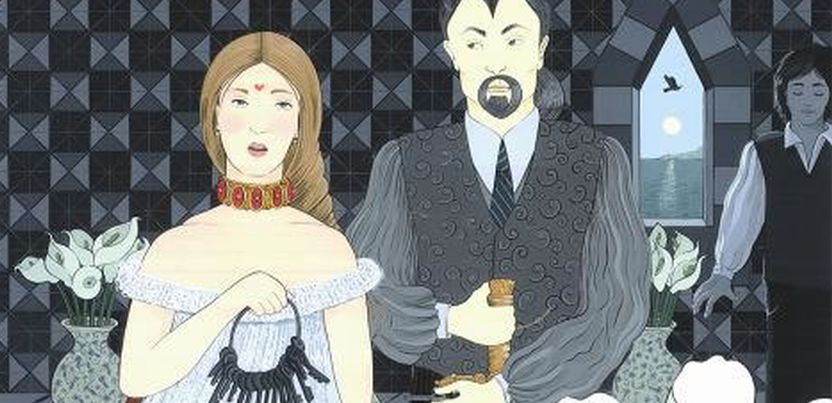 In Angela Carter’s titillating re-telling of Charles Perrault’s Bluebeard, a wealthy, three-times widowed French nobleman marries a seventeen-year-old virtuoso pianist and rushes her away to his secluded castle for a “honeymoon”. When browsing the library, she is shocked to discover his penchant for sadistic pornography. After a passionless consummation that satisfies his desire to have married a virgin, he lays a deadly trap designed to end the marriage. While he is away on business, the woman’s dark newborn curiosity springs the trap, which leads her into his bloody chamber. Themes: manipulation, sexual awakening, depravity, loneliness, curiosity, violence, death. More…
In Angela Carter’s titillating re-telling of Charles Perrault’s Bluebeard, a wealthy, three-times widowed French nobleman marries a seventeen-year-old virtuoso pianist and rushes her away to his secluded castle for a “honeymoon”. When browsing the library, she is shocked to discover his penchant for sadistic pornography. After a passionless consummation that satisfies his desire to have married a virgin, he lays a deadly trap designed to end the marriage. While he is away on business, the woman’s dark newborn curiosity springs the trap, which leads her into his bloody chamber. Themes: manipulation, sexual awakening, depravity, loneliness, curiosity, violence, death. More…
The Woman Who Came at Six O’Clock
 The central theme of this early Gabriel Garcia Márquez story is perception of others. ‘Queen’, the six o’clock regular in José’s restaurant, is a prostitute. Queen’s customers see her as a sex object, to be used and sometimes abused. The police see her as an alcoholic miscreant who cannot be trusted. José, who professes platonic love for Queen, sees the vulnerable human being within. Queen, who claims to be disgusted by all men, sees the caring, kind-hearted José only as someone to be taken advantage of. Other themes: habit, murder, naïveté vs. worldliness, misunderstanding, reputation. More…
The central theme of this early Gabriel Garcia Márquez story is perception of others. ‘Queen’, the six o’clock regular in José’s restaurant, is a prostitute. Queen’s customers see her as a sex object, to be used and sometimes abused. The police see her as an alcoholic miscreant who cannot be trusted. José, who professes platonic love for Queen, sees the vulnerable human being within. Queen, who claims to be disgusted by all men, sees the caring, kind-hearted José only as someone to be taken advantage of. Other themes: habit, murder, naïveté vs. worldliness, misunderstanding, reputation. More…
The Cask of Amontillado
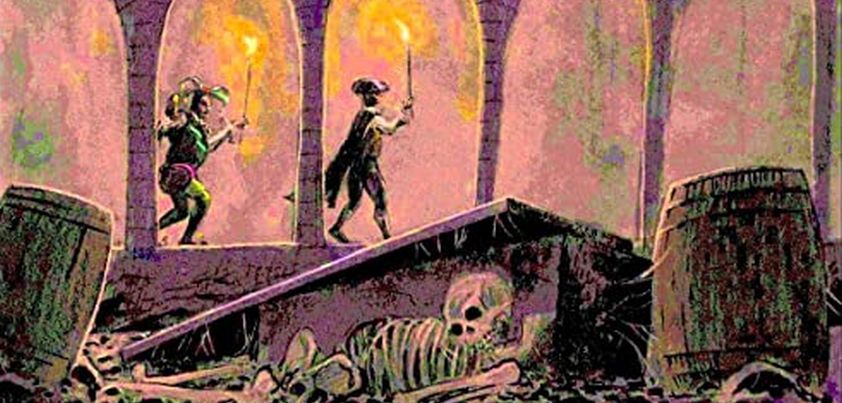 There is not much one can add to what has already been written about this classic tale from Edgar Allan Poe. Widely regarded as one of the world’s greatest Gothic horror stories, it is yet another example of Poe’s ability to supplement situational horror with insights into the twisted minds of his protagonists. The horror aspect of this story about a wine-tasting gone wrong (or right, depending on how you look at it) is enhanced by the ambiguity about the seriousness of the “insult” that lead to the victim’s claustrophobic end. Themes: revenge, trust/deceit, pride, envy, mortality, confession. More…
There is not much one can add to what has already been written about this classic tale from Edgar Allan Poe. Widely regarded as one of the world’s greatest Gothic horror stories, it is yet another example of Poe’s ability to supplement situational horror with insights into the twisted minds of his protagonists. The horror aspect of this story about a wine-tasting gone wrong (or right, depending on how you look at it) is enhanced by the ambiguity about the seriousness of the “insult” that lead to the victim’s claustrophobic end. Themes: revenge, trust/deceit, pride, envy, mortality, confession. More…
Clean Sweep Ignatius
 Jeffrey Archer has come up with an almost unimaginable scenario. Nigeria has a new Finance Minister, Ignatius Agarbi, who decides to clear up his country’s reputation for corruption! He does such a good job, without so much as a breath of scandal, that the country’s President commissions him to find out the names of all ministers and government officials with money hidden away in secret Swiss bank accounts. Diligent as always, Ignatius devises a seemingly foolproof plan to find out just how serious Swiss banks are in maintaining their code of privacy. Themes: corruption, creativity, honor. More…
Jeffrey Archer has come up with an almost unimaginable scenario. Nigeria has a new Finance Minister, Ignatius Agarbi, who decides to clear up his country’s reputation for corruption! He does such a good job, without so much as a breath of scandal, that the country’s President commissions him to find out the names of all ministers and government officials with money hidden away in secret Swiss bank accounts. Diligent as always, Ignatius devises a seemingly foolproof plan to find out just how serious Swiss banks are in maintaining their code of privacy. Themes: corruption, creativity, honor. More…
Saboteur
 This story from Ha Jin begins with what appears to be a simple shakedown attempt by two corrupt Chinese policemen. The victim, who should have known better, attracts the attention of onlookers (who do nothing), resists arrest (a bad move) and challenges their station officer’s authority (bringing a weekend locked up in miserable conditions). When forced to “confess”, he faces loss of his reputation, job and wife. On release, he morphs from victim to villain. The original trumped-up charge was sabotage; his act of revenge is more like biological terrorism! Themes: police brutality and abuse of power, injustice, capitulation, revenge. More…
This story from Ha Jin begins with what appears to be a simple shakedown attempt by two corrupt Chinese policemen. The victim, who should have known better, attracts the attention of onlookers (who do nothing), resists arrest (a bad move) and challenges their station officer’s authority (bringing a weekend locked up in miserable conditions). When forced to “confess”, he faces loss of his reputation, job and wife. On release, he morphs from victim to villain. The original trumped-up charge was sabotage; his act of revenge is more like biological terrorism! Themes: police brutality and abuse of power, injustice, capitulation, revenge. More…
The Green Leaves
 This story from Grace Ogot reads like a folktale. With an overall theme of culture conflict between the modern world and the traditions and beliefs of a Kenyan tribe, the plot can be divided into three sections. The first (ending with Nyagar’s death) has themes of crime, tribal justice, violence, superstition and greed. The second, involving the British authorities, emphasizes colonial arrogance and cultural insensitivity. The third, in which Nyagar’s wife laments his death, introduces a feminist theme. Her chant reflects not only her own loss, but also the powerlessness and complete dependence of all village women on their husbands. More…
This story from Grace Ogot reads like a folktale. With an overall theme of culture conflict between the modern world and the traditions and beliefs of a Kenyan tribe, the plot can be divided into three sections. The first (ending with Nyagar’s death) has themes of crime, tribal justice, violence, superstition and greed. The second, involving the British authorities, emphasizes colonial arrogance and cultural insensitivity. The third, in which Nyagar’s wife laments his death, introduces a feminist theme. Her chant reflects not only her own loss, but also the powerlessness and complete dependence of all village women on their husbands. More…
Han’s Crime
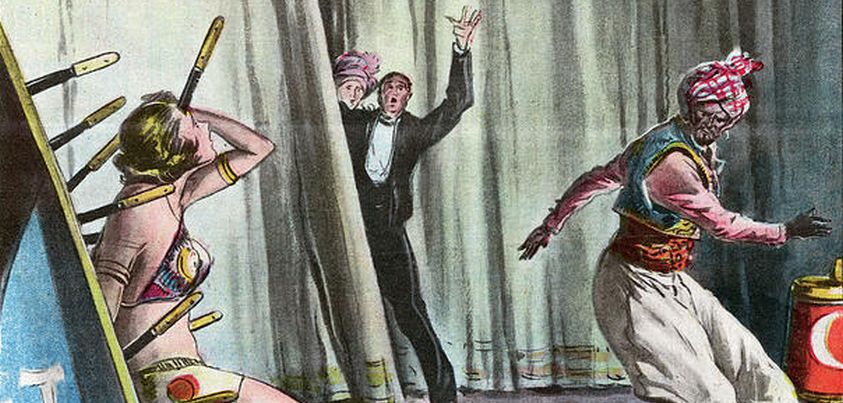 The crime referred to in this fascinating psychological narrative by Shiga Naoya is either murder or manslaughter. A theatre performer (Han) kills his wife during a knife-throwing act. At the end of questioning, the judge asks: Do you not feel the slightest sorrow for your wife’s death? Han answers: None at all! …I never could have imagined I would feel such happiness in talking about her death. The judge (and readers) must decide if the death was a crime or terrible accident. Themes: illegitimacy, infanticide, toxic marriage, conscious vs unconscious actions, legal vs moral guilt, doubt vs certainty. More…
The crime referred to in this fascinating psychological narrative by Shiga Naoya is either murder or manslaughter. A theatre performer (Han) kills his wife during a knife-throwing act. At the end of questioning, the judge asks: Do you not feel the slightest sorrow for your wife’s death? Han answers: None at all! …I never could have imagined I would feel such happiness in talking about her death. The judge (and readers) must decide if the death was a crime or terrible accident. Themes: illegitimacy, infanticide, toxic marriage, conscious vs unconscious actions, legal vs moral guilt, doubt vs certainty. More…
Lord Arthur Savile’s Crime
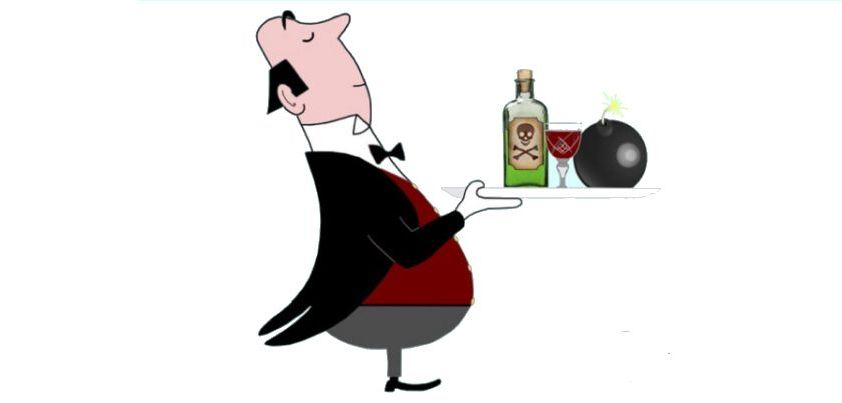 This dark comedy from Oscar Wilde involves a gullible young aristocrat who believes a palm-reader’s prediction that he will commit a murder. Out of consideration for his fiancé, he decides that he should postpone their marriage until he can get the deed out of the way. Convinced that he is merely fulfilling his destiny, the young man feels no guilt in planning and preparing for murder, or indeed remorse afterwards. When he later learns that the palm-reader was a charlatan, he still has no regrets. Themes: the shallowness and hypocrisy of the Victorian upper class, destiny, murder, morals, karma. More…
This dark comedy from Oscar Wilde involves a gullible young aristocrat who believes a palm-reader’s prediction that he will commit a murder. Out of consideration for his fiancé, he decides that he should postpone their marriage until he can get the deed out of the way. Convinced that he is merely fulfilling his destiny, the young man feels no guilt in planning and preparing for murder, or indeed remorse afterwards. When he later learns that the palm-reader was a charlatan, he still has no regrets. Themes: the shallowness and hypocrisy of the Victorian upper class, destiny, murder, morals, karma. More…
Life
 Bessie Head sums up this story in a song title: “That’s What Happens When Two Worlds Collide”. Life, an attractive young prostitute, is forcibly relocated from the bright lights of Johannesburg to her home village in Botswana. Although premarital sex is an integral part of village life, payment for it is unheard of. Life shocks the villagers by taking up her old profession. They are even more shocked when she marries the village’s most eligible bachelor. Themes: village vs. city life (monotony vs. excitement, subsistence vs. easy money), cultural traditions (sexual norms, male domination, women as property), change, oppression, emancipation. More…
Bessie Head sums up this story in a song title: “That’s What Happens When Two Worlds Collide”. Life, an attractive young prostitute, is forcibly relocated from the bright lights of Johannesburg to her home village in Botswana. Although premarital sex is an integral part of village life, payment for it is unheard of. Life shocks the villagers by taking up her old profession. They are even more shocked when she marries the village’s most eligible bachelor. Themes: village vs. city life (monotony vs. excitement, subsistence vs. easy money), cultural traditions (sexual norms, male domination, women as property), change, oppression, emancipation. More…
A Great Day
 An unusual aspect of this story from Frank Sargeson is that it is largely made up of superficial conversations between two ‘friends’ out in a boat for a morning fishing trip. Readers are given sufficient clues to piece together the men’s backgrounds and the major issues between them. However, they must make their own judgements about the grim climax. An important question in assessing Fred’s character is the timing of his plan. Was it a callous, premeditated decision made before the “Great Day”, or a spur of the moment, opportunistic idea? Themes: envy, jealousy, class, self-esteem, masculinity. More…
An unusual aspect of this story from Frank Sargeson is that it is largely made up of superficial conversations between two ‘friends’ out in a boat for a morning fishing trip. Readers are given sufficient clues to piece together the men’s backgrounds and the major issues between them. However, they must make their own judgements about the grim climax. An important question in assessing Fred’s character is the timing of his plan. Was it a callous, premeditated decision made before the “Great Day”, or a spur of the moment, opportunistic idea? Themes: envy, jealousy, class, self-esteem, masculinity. More…
Dry September
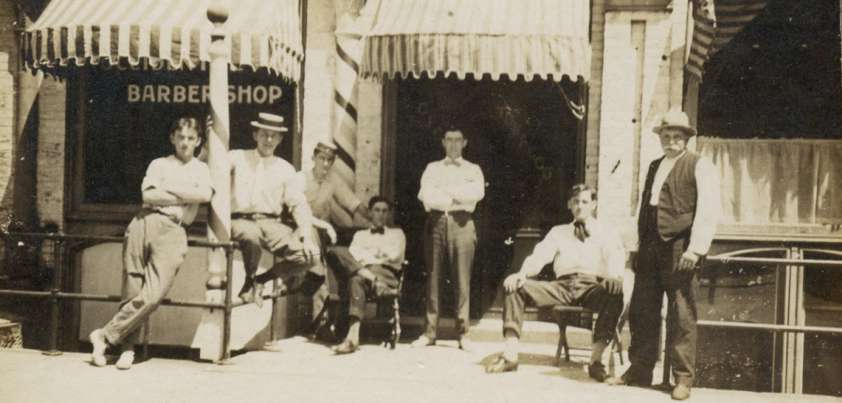 William Faulkner’s Dry September deals with events leading up to and shortly after the vigilante murder of a presumably innocent man. Set in a racially prejudiced community in America’s South, a misplaced or malicious complaint from a middle-aged spinster incites hatred against a local negro. Only one man (the town barber) stands up for him. A decorated ex-soldier leads a mob to avenge the woman’s honor. After the killing, the reliability of the woman’s story is called into question, as is the mental condition of the soldier who is shown to be violent by nature and possibly suffering from PTSD. More…
William Faulkner’s Dry September deals with events leading up to and shortly after the vigilante murder of a presumably innocent man. Set in a racially prejudiced community in America’s South, a misplaced or malicious complaint from a middle-aged spinster incites hatred against a local negro. Only one man (the town barber) stands up for him. A decorated ex-soldier leads a mob to avenge the woman’s honor. After the killing, the reliability of the woman’s story is called into question, as is the mental condition of the soldier who is shown to be violent by nature and possibly suffering from PTSD. More…
Death by Scrabble
 You know that a story which begins It’s a hot day and I hate my wife is not going to end well for one of them. In this story by Charlie Fish, a bored couple sit down for a “friendly” game of scrabble. As the competition intensifies, the man notices something strange. The words the couple put down on the board seem to be coming true in the room around them. To test the theory, he puts down the letters Q-U-A-K-E. As the ground begins to shake, he realizes too late that his wife has made the same discovery. More…
You know that a story which begins It’s a hot day and I hate my wife is not going to end well for one of them. In this story by Charlie Fish, a bored couple sit down for a “friendly” game of scrabble. As the competition intensifies, the man notices something strange. The words the couple put down on the board seem to be coming true in the room around them. To test the theory, he puts down the letters Q-U-A-K-E. As the ground begins to shake, he realizes too late that his wife has made the same discovery. More…
The Boogeyman
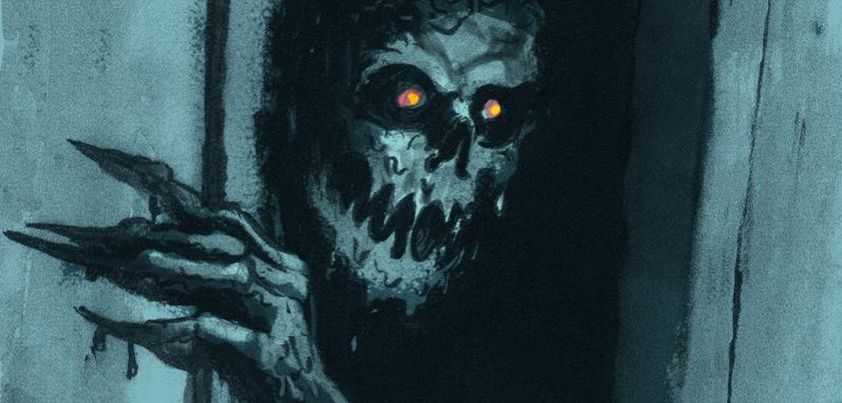 This story by Stephen King explores one of the greatest fears of many young children as they go to bed: the fact that some sort of evil creature may be hiding under their bed, behind the curtains, or in their closet. In the story, a man with serious mental problems blames himself for the death of his three children. He thinks a monster from his childhood killed them, and that it is now coming after him. Readers are left to wonder who or what this boogeyman really is. Themes include fear, imagination, paranoia, mental illness, filicide, guilt. More…
This story by Stephen King explores one of the greatest fears of many young children as they go to bed: the fact that some sort of evil creature may be hiding under their bed, behind the curtains, or in their closet. In the story, a man with serious mental problems blames himself for the death of his three children. He thinks a monster from his childhood killed them, and that it is now coming after him. Readers are left to wonder who or what this boogeyman really is. Themes include fear, imagination, paranoia, mental illness, filicide, guilt. More…
Barcelona
 This story by Alice Adams deals with themes of fear, preparedness, pride, gender expectations and poverty. As a wealthy-looking American couple walk through the darkened streets of Barcelona, a thief grabs the woman’s purse and flees. The husband gives chase and recovers it, but appears strangely disappointed when his wife tells him that she always carries her money in her pocket and the bag contains nothing of value. The wife reflects on how men are always “chasing something” to prove their self-worth, and feels sorry for the plight of the poor who must steal to do so. More…
This story by Alice Adams deals with themes of fear, preparedness, pride, gender expectations and poverty. As a wealthy-looking American couple walk through the darkened streets of Barcelona, a thief grabs the woman’s purse and flees. The husband gives chase and recovers it, but appears strangely disappointed when his wife tells him that she always carries her money in her pocket and the bag contains nothing of value. The wife reflects on how men are always “chasing something” to prove their self-worth, and feels sorry for the plight of the poor who must steal to do so. More…
The Adventure of the Speckled Band
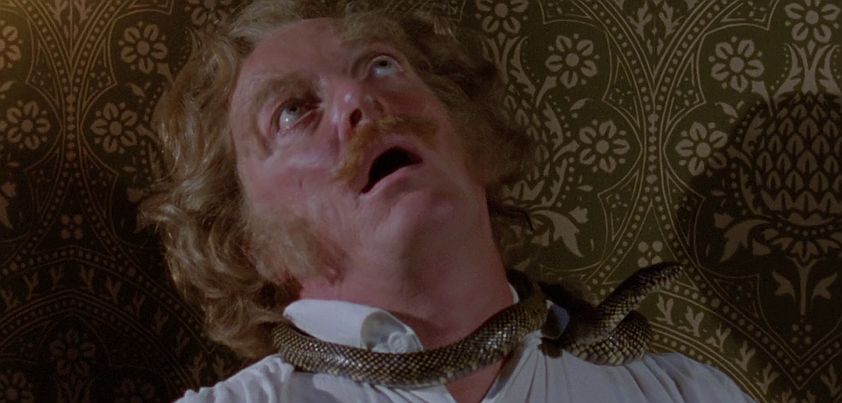 This story, considered by Arthur Conan Doyle to be his best Sherlock Holmes mystery, features one of his most creative (and unlikeliest) murder plots. Thirty-year-old Helen, Holmes’s client, is a victim of Victorian attitudes towards women. Fearing for their future, her dead mother had decided that she and twin sister Julia would not receive their inheritances until they married. Their violent stepfather, who manages the money, will become destitute should either of them wed. After announcing her engagement, Julia dies under mysterious circumstances. Helen fears that she will be next. Themes: decay, isolation, fear, murder, class, greed, hasty judgement, justice. More…
This story, considered by Arthur Conan Doyle to be his best Sherlock Holmes mystery, features one of his most creative (and unlikeliest) murder plots. Thirty-year-old Helen, Holmes’s client, is a victim of Victorian attitudes towards women. Fearing for their future, her dead mother had decided that she and twin sister Julia would not receive their inheritances until they married. Their violent stepfather, who manages the money, will become destitute should either of them wed. After announcing her engagement, Julia dies under mysterious circumstances. Helen fears that she will be next. Themes: decay, isolation, fear, murder, class, greed, hasty judgement, justice. More…
The Love of My Life
 This T. C. Boyle story holds a powerful message for teenagers in their first serious relationship. All too often, young lovers mistake the closeness that comes with shared sexual awakening for long-term, enduring love. The truth remains hidden until the relationship is tested in some way, in this case with an unplanned pregnancy. Initially, readers admire the young couple for the strength of their affection towards each other. Disappointment begins with the girl’s selfish indecision about the pregnancy, quickly followed by disgust at the couple’s terrible treatment of the new-born baby and willingness to blame each other for what happens. More…
This T. C. Boyle story holds a powerful message for teenagers in their first serious relationship. All too often, young lovers mistake the closeness that comes with shared sexual awakening for long-term, enduring love. The truth remains hidden until the relationship is tested in some way, in this case with an unplanned pregnancy. Initially, readers admire the young couple for the strength of their affection towards each other. Disappointment begins with the girl’s selfish indecision about the pregnancy, quickly followed by disgust at the couple’s terrible treatment of the new-born baby and willingness to blame each other for what happens. More…